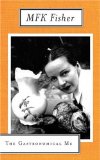When you decide, as an appreciator of food and food-writing, that you’re going to read MFK Fisher, it can be very difficult to know where to start. She has a rather large body of worked scattered throughout various memoirs, anthologies, and publications. Fisher is infinitely quotable and (I’m sorry to say) until I had read this book, her quotes and a few articles about her were my only exposure. To help fill the void, I picked up what is considered by some to be her best book – The Gastronomical Me



In childhood, there was peach pie and cream. She recounts her first oyster, consumed in her teenage years during a fancy dinner at the boarding school she was attending. As an adult, her food (as her life) increased in complexity. She was served truite au bleu (a live trout, quickly gutted and plunged into court bouillon so that it curls and its skin turns blue) by a food-crazy maid even as she was trying to work out her marriage to one man and her increasing love for another. Once she gave into that passion, curiously, she ate simply of fresh food from their garden. If eating is an art form (and Fisher most certainly would have seen it as such), then art certainly imitates life here.
One concept Ms. Fisher goes back to repeatedly is “The Measure of My Powers”. Her book begins with a Santayana quote: To be happy, you must have taken the measure of your powers, tasted the fruits of your passion, and learned your place in the world. In her reflection on her own self-discovery, it is clear that she has taken the measure of her powers and is pleased with what she sees. She is comfortable dining alone. She is content to take her luxurious time with her food and enjoy it to the fullest. She is willing to take weeks-long voyages across the Atlantic alone and with her own individual purposes in mind. It may seem silly to us independent women of the twenty-first century, but in the 1930s, this sort of willfulness and self-sufficient attitude were less prevalent, to be sure.
In her forward, MFK (stands for Mary Frances Kennedy) Fisher explains to us why she considers food and eating important enough to write about. Perhaps people wonder why someone who clearly has a wonderful writing talent wouldn’t tackle the larger subjects in life. Fisher explains that she sees mankind’s three basic needs – food, security, and love – as being endlessly intermingled and interdependent. It is a point she illustrates throughout the book. As she writes about her meals, she’s telling us about the places she’s seen and the emotional and political turmoil of the times. In explaining her eating habits, you learn that she has experienced loves and losses and come out the other side a strong and independent woman.
As mentioned, The Gastronomical Me
In learning more about MFK Fisher after reading the book, I was reminded that in an autobiography, you’re understanding the events of one’s life through the lens of that person’s self understanding. There were certain omissions that I found a little jarring upon discovering them. The more I thought about it though, the more I realized that Ms. Fisher didn’t cheat her audience by leaving this information out of her book. To list the events and facts of one’s life baldly leaves lots of room for speculation and probably too much room for us to dump our own prejudices and perceptions into the mix. Reading her account of events gives us an almost voyeuristic look into what made her, culinary and otherwise, into the woman she was. And to me, that means she’s sharing more information with us, not less.